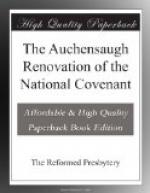the mask and pretexts industriously drawn over it,
will appear to be, perhaps one of the greatest sins
of this nation, and to be little inferior in nature
and aggravations to the burning of the covenants,
which is granted by all Presbyterians to be a most
atrocious act of contempt done to the eternal God,
and to his Son Jesus Christ, and cannot be called
to mind by any of the godly without great abhorrence
and detestation of it; in so far as the passing over
and not ratifying these acts of Parliament and Assembly
by the respective judicatories, which were made during
that time of reformation, was a practical and interpretative
condemning of them as unprofitable, and did greatly
corroborate the acts whereby Charles II. had declared
them null and not obligatory; and did likewise import
a vilifying and despising of what God had wrought
for his people in these lands, during that time; and,
lastly, was a manifest indication of disregard to the
oath of God, which these lands had come under.
Neither did that, nor any succeeding Assembly, impartially
and explicitly enumerate the land’s sins in their
national fasts; namely, the indulgence and toleration,
with the addresses and thanksgiving for it, and the
burning of the covenant, &c.; neither have they, in
any of their addresses to their King or Queen, by
letters, or other means, declared unto them the indispensable
duty of renewing the covenants, nor applied to the
Parliament for that effect; neither have they, by
their Assembly-acts, asserted the intrinsic power
of the church; neither did they in any of their acts,
or public papers, make honourable mention of those
who had laid down their lives for their adherence
to Christ’s truths during the times of persecution,
nor testified their approbation of what was done that
way; and yet many of us have been wanting in testifying
our dislike of these backsliding courses, by discountenancing,
withdrawing from, and keeping ourselves free of all
participation with them; but have received the sacraments
of Baptism and the Lord’s Supper, and the privilege
of marriage at their hands, and paid tithes and stipends.
By all which, it is apparent now much indifferency
there has been in this cause of covenanted interest,
which so much concerneth the glory of God, the good
of the kingdoms, and the honour of the civil Magistrate.
Moreover in the same Article we are sworn, “All
the days of our lives, zealously and constantly to
continue in this cause, against all lets and impediments
whatsoever, and what we are not able ourselves to suppress
and overcome, to reveal and make known the same that
it may be timeously prevented. And in the National
Covenant, never to cast in any let, that may stop
or hinder any such resolution, as by common consent
shall be found to conduce for so good ends; but on
the contrary, by all lawful means, to labor to further
and promote the same; and if any such dangerous or
divisive motion be made to us by word or writ, that
we and every one of us shall either suppress it, or
if need be, incontinent make the same known, that
it may be timeously obviated. Agreeing very well
with the scriptures.” Numb. xiv. 9, 10;
Neh. vi. 3, 6, 8, 9, 10, 11; Isa. viii. 12, 13, 14;
Acts iv. 19, 20, 24, xxi. 13; Gal. ii. 5; Phil. i.
28.




